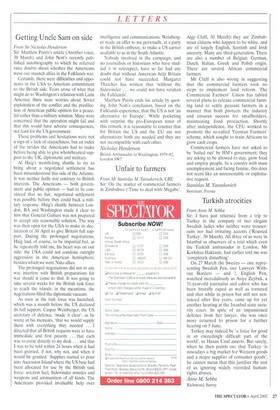Getting Uncle Sam on side
From Sir Nicholas Henderson Sir: Matthew Parris's article (Another voice, 30 March) and John Nott's recently published autobiography to which he referred raise doubts about whether the Americans were our staunch allies in the Falklands war.
Certainly, there were difficulties and opponents in the USA to American commitment to the British side. Fears arose of what that might do to Washington's relations with Latin America; there were worries about Soviet exploitation of the conflict and the predilection of American public opinion for a peaceful rather than a military solution. Many were concerned that the operation might fail and that this would have adverse consequences, not least for the US government.
These problems and hesitations were not a sign of a lack of staunchness, but an index of the strides the Americans had to make before being able to give wholehearted support to the UK, diplomatic and military.
Al Haig's month-long shuttle to try to bring about a negotiated settlement has been misunderstood this side of the Atlantic. It was neither futile nor contrary to British interests. The Americans — both government and public opinion — had to be convinced that no fair, negotiated settlement was possible before they could back a military response. Haig's shuttle between London, BA and Washington made it clear to him that General Galtieri was not prepared to accept any reasonable solution. The way was then open for the USA to make its declaration of 30 April to give Britain full support. During the prolonged negotiations, Haig had. of course, to be impartial but, as he repeatedly told me, his heart was on our side: the USA could not condone outright aggression in the American hemisphere; besides which we were Nato allies.
The prolonged negotiations did not in any way interfere with British preparations for war should it come to that. It was going to take several weeks for the British task force to reach the islands; in the meantime, the negotiations filled the diplomatic vacuum.
As soon as the task force was launched, which was a month before the US declared its full support, Caspar Weinberger, the US secretary of defence, 'made it clear', as he wrote in his memoirs, 'that we would supply them with everything they needed . . . I directed that all British requests were to have immediate and first priority . . . that each was to come directly to my desk .. . and that I was to be told within 24 hours when it had been granted, if not, why not, and when it would be granted.' Supplies started to pour into Ascension Island where the US base had been allocated for use by the British task force: aviation fuel, Sidewinder missiles and weapons and ammunition of all kinds, The Americans provided invaluable help over
intelligence and communications. Weinberger made an offer to me personally, at a party in the British embassy, to make a US carrier available to us in the South Atlantic.
Nobody involved in the campaign, and no journalists or historians who have studied it in retrospect, have so far had any doubt that without American help Britain could not have succeeded. Margaret Thatcher has written that 'without the Sidewinder . . . we could not have retaken the Falklands'.
Matthew Parris ends his article by quoting John Nott's conclusion, based on the Falklands experience, that the US is not 'an alternative to Europe'. While pocketing with surprise the pro-European tenor of this remark, it is reasonable to counter that for Britain the US and the EU are not alternatives: both are needed and they are not incompatible with each other.
Nicholas Henderson
British Ambassador to Washington, 1979-82. London SW7






























































 Previous page
Previous page